With all the talk in P.E.T. about how anger is a secondary emotion, however, some participants have seemed stumped and even sheepish when trying to identify their feelings.
"All I know is I'm angry, but I'm not supposed to feel that, am I?"
"I know I have to find what's beneath the anger but what do I do about the fact that I want to strangle my kid?"
Gee, I guess we all must have missed the school lesson on how to deal with anger. Hah! So few of us -- are there any? -- have been supported with processing any emotion, much less this biggie.
Doing this important work now, though, means we can give a ginormous gift to our children through modeling and consulting!



























